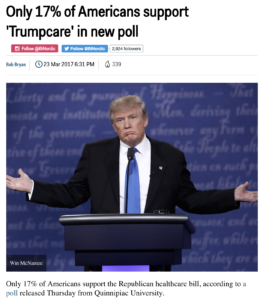 Minnesota gubernatorial candidate Jeff Johnson (R-Plymouth) is crying foul over an Alliance for Better Minnesota television ad that says Johnson’s health care proposals would take health care away from Minnesotans who need it.
Minnesota gubernatorial candidate Jeff Johnson (R-Plymouth) is crying foul over an Alliance for Better Minnesota television ad that says Johnson’s health care proposals would take health care away from Minnesotans who need it.
But the Alliance’s ad is accurate. Without question, the health care “reform” approach candidate Johnson is promoting during his campaign would take health care away from Minnesotans who need it.
Let’s break down the proposed JohnsonCare plan, piece-by-piece.
Johnson Eliminating ACA Protections
Johnson wants to make the Affordable Care Act (ACA) a thing of the past in Minnesota, via a federal waiver granted by the Trump Administration. More specifically, Johnson wants to eliminate the ACA approach that has:
- Protected Record Numbers of Minnesotans. Under the ACA framework, Minnesota achieved the highest rate of health care coverage in state history.
- Made Previously Unaffordable Protections Affordable. For lower and middle-income Minnesotans who don’t get coverage through their employer, the ACA has provided hundreds of millions in financial assistance to reduce or eliminate premium costs.
- Strengthened Minnesotans’ Protections. The ACA also banned the hated preexisting condition denials, insurance payment limits, and dangerous junk coverage. Because fewer Americans are no longer living one illness or injury away from being crushed by a mountain of bankrupting medical bills, personal bankruptcies have decreased by 50 percent during the time the ACA has existed.
If Johnson eliminates the increasingly popular ACA protections in Minnesota, that all goes away. So yes, in several different and dramatic ways, Johnson absolutely would take health care away from Minnesotans who need it. The ad is correct about that.
Johnson’s False Claims
Johnson’s criticism of his opponent’s health care proposal is also utterly ridiculous. Johnson says claims opponent Tim Walz “wants to eliminate private health insurance and force all Minnesotans onto one government program.”
The reality is, Walz supports a MinnesotaCare buy-in option. Under that approach, Minnesotans would have the option of either buying private plans or buying into the MinnesotaCare program, which is a government program operated by private health insurance programs.
In other words, Johnson’s claims that Walz wants to “eliminate private health insurance” and “force all Minnesotans onto one government program” are flat wrong.
If Walz is proposing a government-run single payer plan in the short-term, I’m not aware of it. Even if that were true, Johnson’s inference that eliminating private insurance in favor of government run health care would hurt Minnesotans is also wrong. After all, Medicare, a government-run health plan, is popular and effective. Medicare is helping Minnesotans, not hurting them.
Moreover, government run health plans are used in many other developed nations. Compared to the United States, consumers in those nations have 1) universal comprehensive coverage, 2) lower overall health costs and 3) better overall health outcomes.
JohnsonCare and TrumpCare
Instead of the ACA, Johnson wants to back a high risk pool program that was very expensive for both consumers and taxpayers when it was used pre-ACA. Minnesota Public Radio reported:
Craig Britton of Plymouth, Minn., once had a plan through the state’s high-risk pool. It cost him $18,000 a year in premiums.
Britton was forced to buy the expensive MCHA coverage because of a pancreatitis diagnosis. He calls the idea that high-risk pools are good for consumers “a lot of baloney.”
“That is catastrophic cost,” Britton says. “You have to have a good living just to pay for insurance.”
And that’s the problem with high-risk pools, says Stefan Gildemeister, an economist with Minnesota’s health department.
“It’s not cheap coverage to the individual, and it’s not cheap coverage to the system,” Gildemeister says.
MCHA’s monthly premiums cost policy holders 25 percent more than conventional coverage, Gildemeister points out, and that left many people uninsured in Minnesota.
Johnson also wants to promote “junk,” “short-term,” or “skinny” plans, which are cheap because they don’t cover basic protections. Promoting junk plans to reduce health care costs is like promoting cheaper cars lacking seat belts, airbags, crumple zones, safety glass, and anti-lock brakes. They look good if you’re only considering the price tag, but they’re a disaster when you and your family are in dangerous situations and desperately need those life-saving protections.
On health care, as with so most other issues, Jeff Johnson is aping Trump. President Trump is obsessed with eliminating Americans’ ACA protections in favor of a skimpy TrumpCare replacement. Trump insists that TrumpCare will cover everyone and cut costs, while the nonpartisan Congressional Budget Office finds that 23 million Americans would lose their protections, and millions more would pay higher premiums.
So Minnesotans, if you like TrumpCare – and only 17% of Americans do – you’re going to love JohnsonCare.
